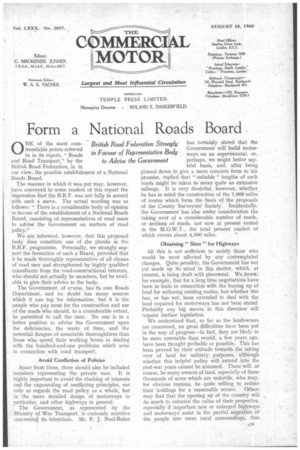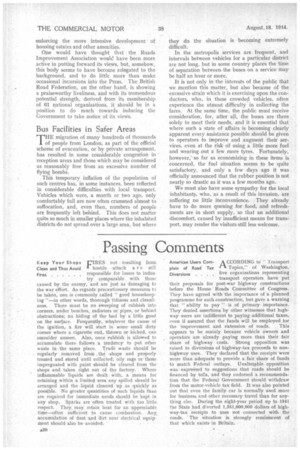Form a National Roads Board
Page 21

Page 22

If you've noticed an error in this article please click here to report it so we can fix it.
0 NE of the most commendable points referred to in its report, " Roads and Road Transport," by the British Road Federation, is, in our view, the possible establishment of a National Roads Board.
The manner in which it was put may, however, have conveyed to some reader § of this report the impression that the B.R.F. was not fully.in accord with such a move. The actual wording was as follows : " There is a considerable body of opinion in favour of the establishment of a National Roads Board, consisting of representatives of road users to advise the Government on matters of road policy."
We are informed, however, that this proposed body does constitute one of the planks in the B.R.F. programme. Personally, we strongly support the formation of such a Board, provided that it be made thoroughly representative of all classes of road user and strengthened by highly qualified consultants from the road-constructional interests, who should not actually be members, but be available to give their advice to the body.
The Government, of course, has its own Roads Departinent, and no doubt has many sources which it can tap for information, but it is the people who pay most for the construction and use of the roads who should, to a considerable extent, be permitted to call the tune. No one is in a better position to advise the Government upon the deficiencies, the waste of time, and the potential dangers of unsuitable thoroughfares than those who spend their working hours in dealing with the hundred-and-one problems which arise in connection with road transport.
Avoid Confliction of Policies Apart from these, there should also be included members representing the private user. It ishighly important to avoid the clashing of interests and the expounding of conflicting principles, not only as regards the road policy as a whole, but in the more detailed design of motorways in particular, and other highways in general.
The Government, as represented by the Ministry of War Transport, is curiously secretive concerning its intentions. Mr. P. J. Noel-Baker has certainly stated that the Government will build motorways on an experimental, or, perhaps, we might better say, trial basis, and, after being pinned down to give a more concrete form to his promise, replied that " suitable " lengths of such roads might be taken to mean quite an extensive mileage. It is very doubtful, however, whether he has in mind the construction of the 1,000 miles of routes which form the basis of the proposals of the County Surveyors' Society. Tncidentally. the Government has also under consideration the taking over of a considerable number of roads, or sections of roads, not now at present vested in the M.O.W.T., the total present control of which covers about 4,500 miles.
Obtaining" Sites "for Highways All this is not sufficient to satisfy those who would be most affected by any contemplated changes. Quite possibly, the Government has not yet made up its mind in this matter, which, at present, is being dealt with piecemeal. We know, for example, that for a long time negotiations have been in train in connection with the buying up of land for widening existing routes, but whether this has, or has not, been extended to deal with the land required for motorways has not been stated. Probably any big moves in this direction will require further legislation.
We understand that, so far as the landowners are concerned, no great difficulties have been put in the way or progress—in fact, they are likely to be more amenable than would, a few years ago, have been thought probable or possible. This has been proved by their attitude towards the taking over of land for military purposes, although whether this helpfill policy will extend into the post-war years cannot be assumed. There will of course, be many owners of land, especially of those thousands of acres which are unfertile, who may, for obvious reasons, be quite willing to reduce their holdings for a reasonable return. Others may find that the opening up of the country will do much to enhance the value of their properties, especially if important new or enlarged highways and motonvays assist in the partial migration of the people into more rural surroundings, thus enforcing the more intensive development of housing estates and other amenities.
One would have thought that the Roads Improvement Association would have been more active in putting forward its views, but, somehow, this body seems to have become relegated to the background, and to do little more than make occasional incursions into the Press. The British Road Federation, on the other hand, is showing a praiseworthy liveliness, and with its tremendous potential strength, derived from its membership of 61 national organizations, it should he in a position to do much towards inducing the Government to take notice of its views.
Bus Facilities in Safer Areas
THE migration of many hundreds of thousands of people from London, as part of the official scheme of evacuation, or by private arrangement, has resulted in some considerable congestion in reception areas and those which may be considered as reasonably free from an excessive number of flying bombs.
This temporary inflation of the population of such centres has, in some instances, been reflected in considerable difficulties with local transport. Vehicles which were, a month or two ago, only comfortably full are now often crammed almost to suffocation, and, even then, numbers of people are frequently left behind. This does not matter quite so much in smaller places where the inhabited districts do not spread over a large area, but where they do the situation is becoming extremely difficult.
In the metropolis services are frequent, and intervals between vehicles for a particular district are not long, but in some country places the time of separation between the buses on a service may be half an hour or more.
It is not only in the interests of the public that we mention this matter, but also because of the -excessive strain which it is exercising upon the conductors, who, in these crowded vehicles, often experience the utmost difficulty in collecting the fares. At the same time, the public must receive consideration, for, after all, the buses are there solely to meet their needs, and it is essential that where such a state of affairs is becoming clearly apparent every assistance possible should be given to operators to improve and augment their services, even at the risk of using a little more fuel and wearing out a few more tyres. Fortunately, however,"so far as economizing in these items is concerned, the fuel situation seems to be quite satisfactory, and only a few days ago it was officially announced that the rubber position is not nearly so drastic as it was a few months ago.
We must also have some sympathy for the local inhabitant, who, as a result of this invasion, are suffering no little inconvenience. They already have to do more queuing for food, and refreshments are in short supply, so that an additional discomfort, caused by insufficient means for transport, may render the visitors still less welcome.




























































